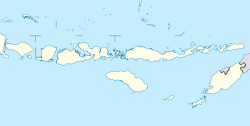Atambua | |
|---|---|
Town | |
| Coordinates: 9°6′22″S 124°53′33″E / 9.10611°S 124.89250°E | |
| Country | |
| Region | Lesser Sunda Islands |
| Province | East Nusa Tenggara |
| Regency | Belu Regency |
| Area | |
| • Total | 63.79 km2 (24.63 sq mi) |
| • Land | 63.79 km2 (24.63 sq mi) |
| • Water | 0.0 km2 (0.0 sq mi) 0% |
| Elevation | 350 m (1,150 ft) |
| Population (mid 2023 estimate) | |
| • Total | 76,732 |
| [1] | |
| Time zone | UTC+8 (ICST) |
| Area code | (+62) 389 |
| Climate | Aw |
| Website | belukab |
Atambua is the regency seat of Belu Regency, East Nusa Tenggara, Indonesia.
The town stretches as far as 8.5 km from north to south and 5 km from east to west, and is located in the north of the western half of Timor Island. The town is located at an altitude of about 350 m above sea level with temperatures ranging between 23 and 35 degrees Celsius making this area feel quite warm.
An influx of citizens fleeing from East Timor in 1999 made Atambua a big town. It is now the second-largest town in West Timor behind Kupang, also the fourth-largest town in East Nusa Tenggara behind Kupang, Maumere and Ende. Most of its citizens speak the Belunese dialect of Tetun and also Dawan. Atambua is a multi-ethnic town with most of its citizens from Timor, Rote, Sabu, and Flores with some emigrants from East Timor and China. But in spite of diversity, the citizens still live in harmony.
The town's religion is made up of over 90% of Roman Catholic, 5% of Protestant and a few more of Muslim, Hindu, and Buddhist. The town is home to the Roman Catholic Diocese of Atambua. The Diocese's population is over 95% Catholic, among the highest percentages of Catholics in all of Indonesia.
- ^ Badan Pusat Statistik, Jakarta, 26 September 2024, Kabupaten Belu Dalam Angka 2024 (sum of returns from District Katalogs as referenced below)


